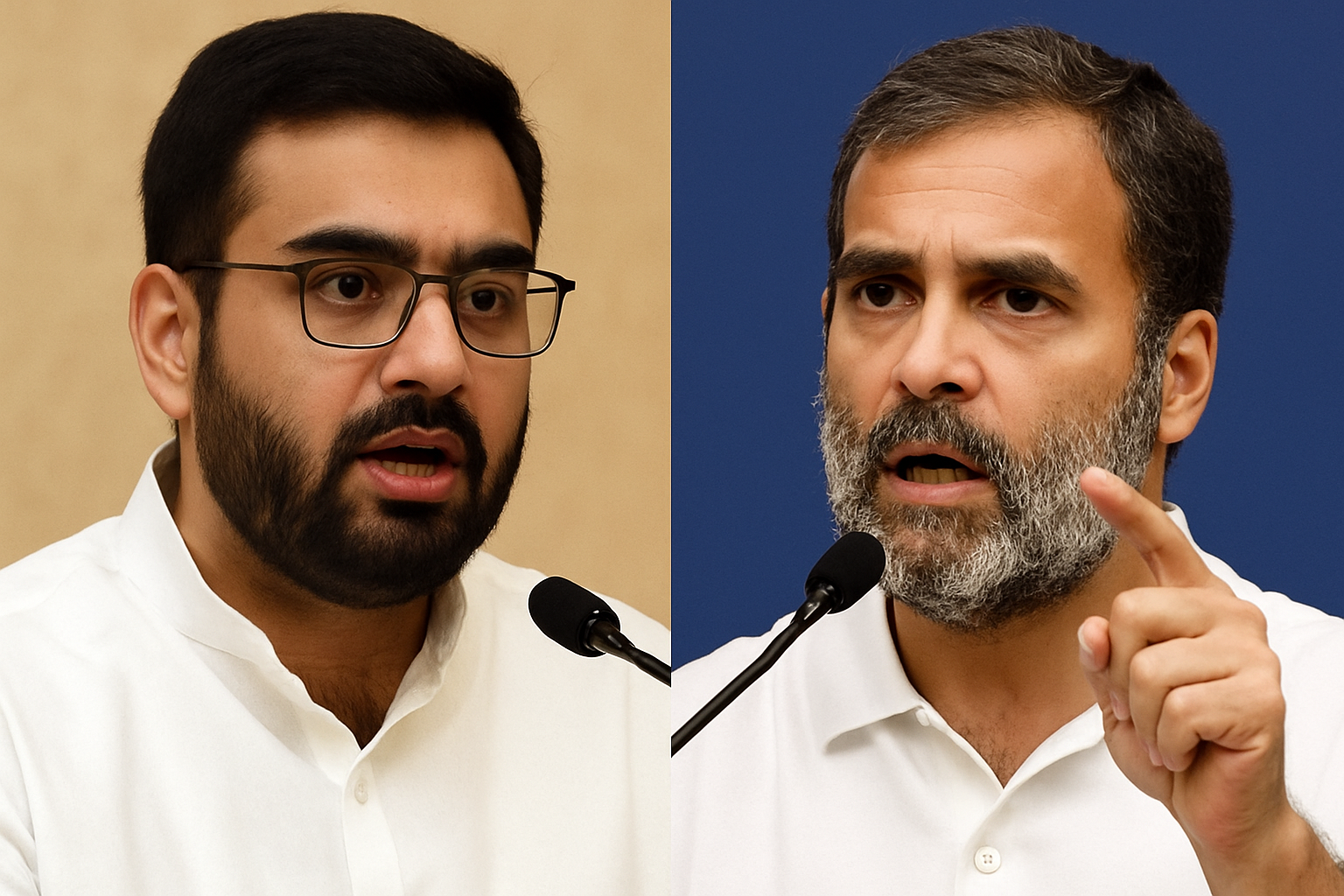Rohan Jaitley Responds to Rahul Gandhi’s Remark on Father

Rohan Jaitley Responds to Rahul Gandhi’s Remark on Father Arun Jaitley: A Clash of Legacy and Politics
The political discourse in India has always been charged, passionate, and at times, intensely personal. One recent instance that sparked public debate was Congress leader Rahul Gandhi’s remark involving the late Arun Jaitley — a statesman, senior BJP leader, and former Union Finance Minister. Responding to this, Rohan Jaitley, Arun Jaitley’s son and current President of the Delhi & District Cricket Association (DDCA), issued a dignified yet sharp statement defending his father’s legacy and values.
This incident has reignited the broader conversation around political decorum, the boundaries of criticism, and the importance of legacy in Indian politics. In this article, we explore the context, reactions, and implications of this high-profile exchange, along with a look back at the contributions of Arun Jaitley and the values he represented.
Context: What Did Rahul Gandhi Say?
Rahul Gandhi, known for his pointed criticisms of the ruling Bharatiya Janata Party (BJP), made a reference to Arun Jaitley during a recent rally. While criticizing the BJP’s economic policies and leadership style, Gandhi remarked on the functioning of key ministries during Jaitley’s tenure. He implied that Arun Jaitley, though articulate and soft-spoken, failed to act in ways that truly served the public interest.
The statement quickly drew reactions, with many seeing it as an unfair attack on a leader who is no longer alive to defend himself.
Rohan Jaitley’s Response: A Son Defends His Father’s Honor
Rohan Jaitley, who has largely stayed away from frontline politics, issued a composed but impactful statement in response to Gandhi’s comments. In his response, he said:
“That was simply who he was — dignified, thoughtful, and principled. He believed in debating ideas, not attacking individuals. Even when he disagreed with someone, he did so respectfully. To reduce his legacy to political point-scoring is unfortunate and disrespectful.”
This statement was widely circulated across social media and news channels. Rohan’s words resonated with many across party lines, who remembered Arun Jaitley as a political leader known for his intellect, civility, and capacity to build consensus.
Who Was Arun Jaitley?
Early Life and Legal Career
Arun Jaitley was born on December 28, 1952. A brilliant student, he pursued law at the University of Delhi and quickly established himself as a prominent advocate. He was designated as a Senior Advocate by the Delhi High Court at the age of 38 and appeared in several landmark cases in the Supreme Court and various High Courts.
Entry into Politics
Jaitley entered active politics in the 1970s during the JP Movement. He was imprisoned during the Emergency and was associated with the ABVP and later, the BJP. Known for his sharp legal mind and articulate public speaking, he rose swiftly within the party ranks.
Ministerial Roles
Arun Jaitley held several key portfolios in various BJP-led governments:
- Finance Minister (2014–2019): Spearheaded economic reforms like GST, Insolvency and Bankruptcy Code (IBC), and demonetization.
- Minister of Corporate Affairs
- Minister of Defence (interim)
- Minister of Information and Broadcasting
His influence was not limited to the ministries he led; Jaitley was often seen as the BJP’s chief strategist, managing critical alliances and negotiations across the political spectrum.
Reactions to Rohan Jaitley’s Statement
Rohan’s statement prompted widespread reactions:
1. BJP Leaders and Supporters
Senior BJP leaders like Amit Shah, Nirmala Sitharaman, and Rajnath Singh voiced their support for Rohan. Many echoed the sentiment that Arun Jaitley’s legacy deserved respect.
“Arun Ji never engaged in petty politics. He elevated the discourse, and we must remember him for that,” said Amit Shah.
2. Neutral Observers and Political Analysts
Many journalists and commentators praised Rohan for his mature and respectful tone. Rather than a combative or politically charged response, he chose to highlight his father’s values and contributions.
3. Opposition Leaders
While the Congress did not issue an official apology, a few Congress leaders attempted to tone down the controversy by suggesting that Rahul Gandhi’s remark was misinterpreted or misrepresented.
Legacy in Public Life: What Arun Jaitley Stood For
Jaitley’s political philosophy was shaped by a mix of constitutionalism, economic reformism, and principled opposition. Even as he battled political adversaries, he earned praise from across the aisle for his reasoned arguments and personal graciousness.
1. Economic Architect
As Finance Minister, Jaitley played a pivotal role in shaping India’s modern economic architecture:
- GST Implementation: Despite political hurdles, he managed to bring states on board.
- Bankruptcy Reform (IBC): Cleaned up non-performing assets and empowered creditors.
- Demonetization: Though controversial, he stood firm in defending its long-term goals.
2. Legal and Constitutional Mind
Jaitley’s speeches in Parliament were admired for their clarity, depth, and legal precision. He stood up for freedom of speech, advocated for judicial independence, and was instrumental in constitutional amendments related to taxation and financial laws.
3. Mentorship and Leadership
He mentored a generation of BJP leaders and spokespersons, including current Finance Minister Nirmala Sitharaman and External Affairs Minister S. Jaishankar, among others.
Personal Values: Integrity and Civility
One of the defining features of Jaitley’s political career was his unwavering commitment to civility and integrity. Even his critics acknowledged his ability to maintain personal friendships beyond party lines — a rare quality in today’s polarized political climate.
He never used harsh language in Parliament and maintained decorum during the most heated debates. This personal trait was a major point of emphasis in Rohan Jaitley’s response.
Political Attacks and Legacy Politics: Where Is the Line?
Rahul Gandhi’s remark — regardless of intent — has sparked a larger debate on whether political leaders should refer to deceased figures in contemporary criticism.
Should Leaders Be Beyond Critique?
In a democracy, no public figure — living or dead — is beyond critique. However, critics argue that commentary on deceased leaders should be grounded in respect and fact, especially when the individuals being criticized cannot respond.
Political Capital from Legacy?
The use of legacy figures to score points — whether in praise or criticism — is a long-standing tradition in Indian politics. From invoking Nehru and Patel to Ambedkar and Vajpayee, all parties do it. The real question is whether it is done constructively or disparagingly.
Role of Family in Legacy Preservation
Rohan Jaitley’s emergence into the limelight through this issue highlights the delicate balance children of political icons must maintain. Not all choose to enter politics, but they often carry the burden of defending their parents’ legacy.
Rohan’s background as a lawyer and sports administrator places him outside the usual political grind, but his graceful articulation in this matter has made many wonder whether he might have a future in politics — even if reluctantly.
Media and Public Perception
The issue received widespread media coverage. Major newspapers and TV networks debated the incident with varied opinions:
- Supportive Commentary: “Rohan Jaitley sets an example in dignified dissent,” said The Indian Express.
- Critical Takes: Some Congress-leaning platforms argued that Rahul’s criticism was about policy, not personality.
- Public Sentiment: Social media largely rallied behind Rohan Jaitley, trending hashtags like #RespectJaitley and #RohanSpeaks.
The Need for Political Decorum in India
This episode underscores the growing urgency for civil discourse in Indian politics. Personal attacks, below-the-belt remarks, and distortion of legacies have become far too common. Rohan’s response offers a roadmap for how political rebuttal can be both respectful and effective.
A Call for Respect
Indian politics thrives on passionate disagreement, but it need not descend into personal animosity. As Jaitley often quoted, “You can disagree without being disagreeable.”
Recent Posts
Categories
- Actor4
- Actress7
- Assam1
- Bank4
- Bihar5
- Biography2
- Bollywood4
- Business11
- Company9
- Cricket7
- Economy24
- Education7
- Election3
- Entertainment71
- External Affairs Defence Security1
- Finance1
- Football2
- Haryana1
- Health2
- Hollywood2
- Home2
- India84
- India10
- Industry6
- Karnataka1
- Kerala1
- Latest News77
- lifestyle1
- Maharashtra10
- Market7
- Politicians13
- Politics29
- Press Release798
- Social8
- Sports29
- Tamil Nadu2
- Technology25
- Tollywood3
- World49
- World17
Related Articles
“Rajnath Singh Says Modi to Stay BJP’s PM Candidate for Future”
Strong Statement on India’s Political Future Defence Minister Rajnath Singh has sent...
ByNewsium DeskSeptember 24, 2025Rahul Gandhi Accuses CEC of Shielding Democracy Destroyers
Rahul Gandhi Accuses CEC of Shielding Those Who ‘Destroyed Democracy’ Congress leader...
ByNewsium DeskSeptember 18, 2025Trump Repeated India-Pak Ceasefire Claim: Ramesh
Introduction In a striking political critique, senior Congress leader Jairam Ramesh recently...
ByNewsium DeskJuly 15, 2025Aaditya Should Meet Raj If Sena (UBT) Serious: MNS Leader
Introduction In a significant development in Maharashtra’s political landscape, Maharashtra Navnirman Sena...
ByNewsium DeskJune 5, 2025













Leave a comment